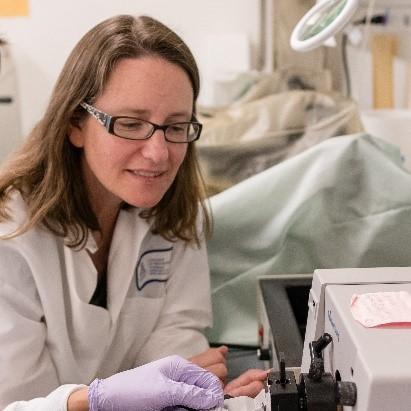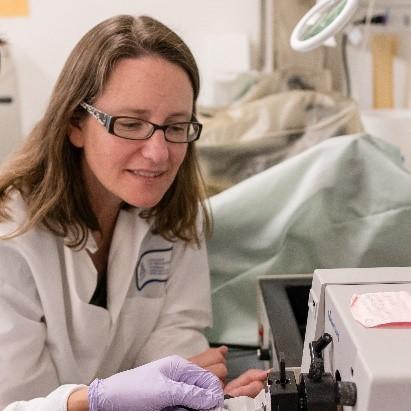
Credit: Tabbitha Mosier, UA College of Medicine – Phoenix
A University of Arizona College of Medicine – Phoenix researcher has received a $393,493 grant from the National Institutes of Health to further her research in reducing the risk of heart failure in patients with high blood pressure.
Taben Hale, PhD, a specialist in cardiovascular pharmacology and associate professor in the Department of Basic Medical Sciences at the UA College of Medicine – Phoenix, is working with Matthew Huentelman, PhD, at the Translational Genomics Research Institute (TGen), to identify a subset of cardiac fibroblasts responsible for the overproduction of scar tissue in the heart.
Fibroblasts are cells in connective tissue that produce collagen and play a critical role in healing. An over-production of collagen, also known as fibrosis, is a common end-stage characterization of nearly every type of heart disease. No approved therapy that directly targets the cells responsible for fibrosis exists. Utilizing ACE inhibitors, Dr. Hale hopes to find a way to kill off a small population of the fibroblasts responsible for the excessive fibrotic response to heart attack or to long-standing hypertension.
ACE inhibitors are a class of commonly used antihypertensive drugs that lower blood pressure by relaxing arteries and promoting excretion of salt and water. ACE inhibitors also have also been shown to protect the heart, in part by reducing collagen deposition.
"If we can identify subsets of cells that may appear with the development of hypertension, we can develop tools to directly target those cells and prevent progression toward heart failure," Dr. Hale said.
Medical advancements have allowed people to survive a heart attack, however, the damaged tissue eventually can lead to heart failure.
"Heart disease has been the No. 1 killer for decades," Dr. Hale said. "In the last 10 years or so we have more people surviving heart attacks, which is great, but consequently we have more people progressing to heart failure."
After a heart attack, scar tissue forms to repair and replace the tissue that has been destroyed. This scar tissue impairs the cardiac contraction necessary to pump blood throughout the body. Over time, the scar tissue continues to expand beyond the initial site of injury in the heart. This can cause stiffening of the heart wall and eventually lead to heart failure.
Dr. Hale recognized that to slow the progression to heart failure, researchers needed to find the subpopulation of fibroblasts that may be responsible for the excess scar tissue.
"We need to do better, and right now with the drugs that we have on the market we still see this progression to heart failure," Dr. Hale said. "We need to find new treatment strategies to stop that course."
###
Dr. Hale's NIH grant No. is 1R56HL141165-01. To learn more about her research, please visit http://phoenixmed.arizona.edu/about/news/taben-hale-phd.
About the University of Arizona College of Medicine – Phoenix
Founded in 2007, the University of Arizona College of Medicine – Phoenix inspires and trains exemplary physicians, scientists and leaders to optimize health and health care in Arizona and beyond. By cultivating collaborative research locally and globally, the college accelerates discovery in a number of critical areas — including cancer, stroke, traumatic brain injury and cardiovascular disease. Championed as a student-centric campus, the college has graduated 433 physicians, all of whom received exceptional training from nine clinical partners and 1,800 diverse faculty members. As the anchor to the Phoenix Biomedical Campus, which is projected to have an economic impact of $3.1 billion by 2025, the college prides itself on engaging with the community, fostering education, inclusion, access and advocacy. For more information, please visit phoenixmed.arizona.edu.
Media Contact
Lindsay Roberts
[email protected]
602-827-2585
http://uahs.arizona.edu/





